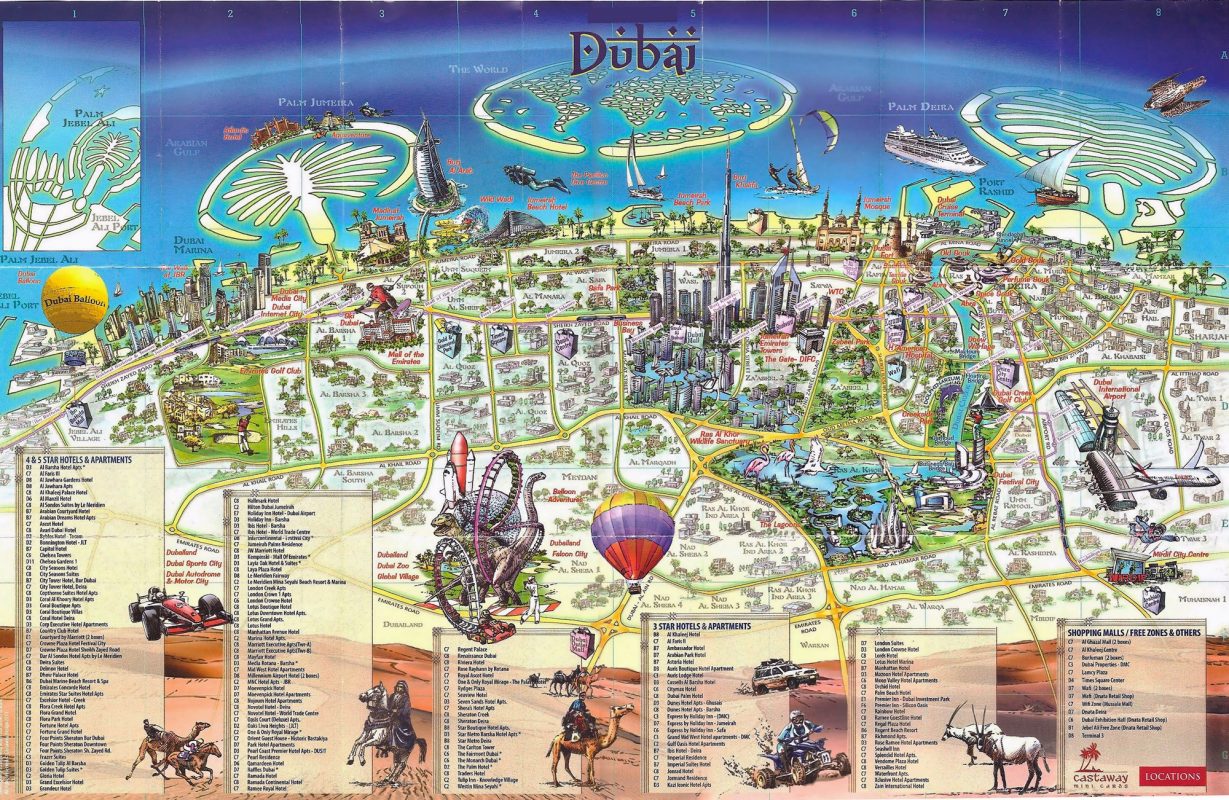
Dubai is the largest and most populous city in the United Arab Emirates (UAE). On the southeast coast of the Persian Gulf, it is the capital of the Emirate of Dubai, one of the seven emirates that make up the country.
Dubai is a global city and business hub of the Middle East. It is also a major global transport hub for passengers and cargo. Oil revenue helped accelerate the development of the city, which was already a major mercantile hub, but Dubai’s oil reserves are limited and production levels are low: today, less than 5% of the emirate’s revenue comes from oil. A growing centre for regional and international trade since the early 20th century, Dubai’s economy today relies on revenues from trade, tourism, aviation, real estate, and financial services.
Dubai has attracted world attention through large construction projects and sports events, in particular the world’s tallest building, the Burj Khalifa. As of 2012, Dubai was the most expensive city in the Middle East. In 2014, Dubai’s hotel rooms were rated as the second most expensive in the world.
DEMOGRAPHICS
According to the census conducted by the Statistics Centre of Dubai, the population of the emirate was 1,771,000 as of 2009, which included 1,370,000 males and 401,000 females. As of June 2017, the population is 2,789,000. The region covers 1,287.5 square kilometres (497.1 sq mi). The population density is 408.18/km2 – more than eight times that of the entire country. Dubai is the second most expensive city in the region and 20th most expensive city in the world.
As of 2013, only about 15% of the population of the emirate was made up of UAE nationals, with the rest comprising expatriates, many of whom either have been in the country for generations or were born in the UAE. Approximately 85% of the expatriate population (and 71% of the emirate’s total population) was Asian, chiefly Indian (51%) and Pakistani (16%); other significant Asian groups include Bangladeshis (9%) and Filipinos (3%). There is a sizable community of Somalis numbering around 30,000, as well as other communities of various nationalities.[ A quarter of the population (local and foreign) reportedly traces their origins to Iran. In addition, 16% of the population (or 288,000 persons) living in collective labour accommodation were not identified by ethnicity or nationality, but were thought to be primarily Asian. There are over 100,000 British expatriates in Dubai, by far the largest group of Western expatriates in the city. The median age in the emirate was about 27 years. In 2014, there were estimated to be 15.54 births and 1.99 deaths per 1,000 people. There are other Arab nationals, including GCC nationals.
Arabic is the national and official language of the United Arab Emirates. The Gulf dialect of Arabic is spoken natively by the Emirati people. English is used as a second language. Other major languages spoken in Dubai due to immigration are Malayalam, Hindi-Urdu (or Hindustani), Gujarati, Persian, Sindhi, Tamil, Punjabi, Pashto, Bengali, Balochi, Tulu, Kannada, Sinhala, Marathi, Telugu, Tagalog and Chinese, in addition to many other languages.
ECONOMY
One of the world’s fastest growing economies, Dubai’s gross domestic product is projected at US$107.1 billion, with a growth rate of 6.1% in 2014. Although a number of core elements of Dubai’s trading infrastructure were built on the back of the oil industry, revenues from oil and natural gas account for less than 5% of the emirate’s revenues. It is estimated that Dubai produces 50,000 to 70,000 barrels (7,900 to 11,100 m3) of oil a day and substantial quantities of gas from offshore fields. The emirate’s share in the UAE’s total gas revenues is about 2%. Dubai’s oil reserves have diminished significantly and are expected to be exhausted in 20 years. Real estate and construction (22.6%), trade (16%), entrepôt (15%) and financial services (11%) are the largest contributors to Dubai’s economy.
Dubai’s non-oil foreign trade stood at $362 billion in 2014. Of the overall trade volumes, imports had the biggest share with a value of $230 billion while exports and re-exports to the emirate stood at $31 billion and $101 billion respectively.
By 2014, China had emerged as Dubai’s largest international trading partner, with a total of $47.7 billion in trade flows, up 29% from 2013. India was second among Dubai’s key trading partners with a trade of $29.7 billion, followed by the United States at $22.62 billion. The Kingdom of Saudi Arabia was Dubai’s fourth trading partner globally and first in the GCC and Arab world with a total trade value of $14.2 billion. Trade with Germany in 2014 totalled $12.3, Switzerland and Japan both at $11.72 billion and UK trade totalled $10.9 billion.
Historically, Dubai and its twin across Dubai Creek, Deira (independent of Dubai City at that time), were important ports of call for Western manufacturers. Most of the new city’s banking and financial centres were headquartered in the port area. Dubai maintained its importance as a trade route through the 1970s and 1980s. Dubai has a free trade in gold and, until the 1990s, was the hub of a “brisk smuggling trade” of gold ingots to India, where gold import was restricted. Dubai’s Jebel Ali port, constructed in the 1970s, has the largest man-made harbour in the world and was ranked seventh globally for the volume of container traffic it supports. Dubai is also a hub for service industries such as information technology and finance, with industry-specific free zones throughout the city. Dubai Internet City, combined with Dubai Media City as part of TECOM (Dubai Technology, Electronic Commerce and Media Free Zone Authority), is one such enclave, whose members include IT firms such as Hewlett Packard Enterprise, HP Inc., Google, EMC Corporation, Oracle Corporation, Microsoft, Dell and IBM, and media organisations such as MBC, CNN, BBC, Reuters, Sky News and AP.
Neighbourhoods
Abu Hail
Al Baraha
Al Bateen
Al Daggayah
Al Garhoud
Al Khabisi
Al Khwaneej
Al Mahaisna
Al Mamzar
Al Marar
Al Marqqabbat
Al Mateena
Al Nahda
Al Qusais
Al Qusais (Ind.)
Al Ras
Al Rashedya
Al Rigga
Al Twar (1,2&3)
Al Waheida
Al Warqa 1
Al Warqa 2
Al Warqa 3
Eyal Naser
Hor Al Anz East
Hor Al Anz West
Mirdif
Mizhar 1
Mizhar 2
Nad Al Hamar
Nad Al Shama
Nad Al Shiba
Naif
Oud Al Mutainah
Port Saeed
Ras Al Khor
Riggat Al Bateen
The international city
Al Badaa & Satwa
Al Barsha 1
Al Barsha 2
Al Barsha 3
Al Hamriya
Al Hudaiba
Al Jaddaf
Al Jafelia
Al Karama
Al Manara
Al Mankhool
Al Quz Industries
Al Quz Residential
Al Rifaa
Al Safa 1 & 2
Al Souk Al Kabeer
Al Sufoh 1
Al Sufoh 2
Al Wasl
Dic , Dmc & Kv.
Dubai investemnt park
Discovery Gardens
JLT
Jumeira 1
Jumeira 2
Jumeira 3
Muntazah
Oud Metha
Palm Springs
Sheikh Zayed Street
Surrounding Dubai Marina
T-com
Umm Al Sheif
Umm Harir 1&2
Umm Sqeim 1
Umm Sqeim 2
Umm Sqeim 3
Zabeel ( Villa )
Emirates Living
8 Boulevard Walk
Burj Views
The Lofts
JBR residence
Palm Jumerah
Dubai Silicon Oasis
Umm Al Ramoul


